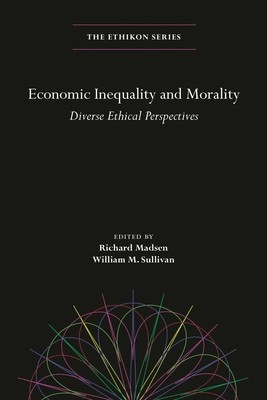
- We will send in 10–14 business days.
- Publisher: Brookings Institution Press
- ISBN-10: 081573719X
- ISBN-13: 9780815737193
- Format: 15 x 22.6 x 2.8 cm, softcover
- Language: English
- SAVE -10% with code: EXTRA
Economic Inequality and Morality (e-book) (used book) | bookbook.eu
Reviews
Description
Examining inequality through the lenses of moral traditions
Rising inequality has attracted a great deal of attention in recent years from scholars and politicians, but the moral dimensions of inequality tend to be ignored. Is inequality morally acceptable? Is it morally permissible to allow practices and systems that contribute to inequality? Is there an ethical obligation to try to alleviate inequality, and if so, who is obligated to take that action?
This book addresses these and similar questions not through a single lens of morality but through a comparative study of ethical traditions, both secular and religious, Western and non-Western. The moral and political traditions considered are: liberalism, Marxism, natural law, feminism, Buddhism, Judaism, Islam, Christianity, and Confucianism. The types of inequality examined include property, natural resources, products, wealth, income, jobs, and taxation. The editors open the book with an introduction providing information on contemporary dimensions of the problem of economic inequality, and the book concludes with a summary of the perspectives represented.
Economic Inequality and Morality is unusual in that it addresses similarities and differences on the questions of inequality within and across moral traditions. Authors of the individual studies answer a common set of topic-related questions, giving the reader a broad perspective on how a broad range of traditions view and respond to inequality.
EXTRA 10 % discount with code: EXTRA
The promotion ends in 18d.12:42:38
The discount code is valid when purchasing from 10 €. Discounts do not stack.
- Publisher: Brookings Institution Press
- ISBN-10: 081573719X
- ISBN-13: 9780815737193
- Format: 15 x 22.6 x 2.8 cm, softcover
- Language: English English
Examining inequality through the lenses of moral traditions
Rising inequality has attracted a great deal of attention in recent years from scholars and politicians, but the moral dimensions of inequality tend to be ignored. Is inequality morally acceptable? Is it morally permissible to allow practices and systems that contribute to inequality? Is there an ethical obligation to try to alleviate inequality, and if so, who is obligated to take that action?
This book addresses these and similar questions not through a single lens of morality but through a comparative study of ethical traditions, both secular and religious, Western and non-Western. The moral and political traditions considered are: liberalism, Marxism, natural law, feminism, Buddhism, Judaism, Islam, Christianity, and Confucianism. The types of inequality examined include property, natural resources, products, wealth, income, jobs, and taxation. The editors open the book with an introduction providing information on contemporary dimensions of the problem of economic inequality, and the book concludes with a summary of the perspectives represented.
Economic Inequality and Morality is unusual in that it addresses similarities and differences on the questions of inequality within and across moral traditions. Authors of the individual studies answer a common set of topic-related questions, giving the reader a broad perspective on how a broad range of traditions view and respond to inequality.


Reviews